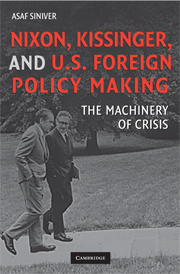Book contents
- Frontmatter
- Contents
- List of Figures
- Acknowledgments
- Abbreviations
- Dramatis Personae
- Nixon, Kissinger, and U.S. Foreign Policy Making
- Introduction
- 1 Structures, Processes, and Personalities in U.S. Foreign Policy
- 2 The Making of U.S. Foreign Policy During the Nixon-Kissinger Years
- 3 The Incursion into Cambodia, Spring 1970
- 4 The Jordanian Crisis, September 1970
- 5 The India-Pakistan War, December 1971
- 6 The Yom Kippur War, October 1973
- Conclusion
- Bibliography
- Index
- Plate section
- References
1 - Structures, Processes, and Personalities in U.S. Foreign Policy
Published online by Cambridge University Press: 17 August 2009
- Frontmatter
- Contents
- List of Figures
- Acknowledgments
- Abbreviations
- Dramatis Personae
- Nixon, Kissinger, and U.S. Foreign Policy Making
- Introduction
- 1 Structures, Processes, and Personalities in U.S. Foreign Policy
- 2 The Making of U.S. Foreign Policy During the Nixon-Kissinger Years
- 3 The Incursion into Cambodia, Spring 1970
- 4 The Jordanian Crisis, September 1970
- 5 The India-Pakistan War, December 1971
- 6 The Yom Kippur War, October 1973
- Conclusion
- Bibliography
- Index
- Plate section
- References
Summary
The vast bulk of ‘liberals’ in the U.S. Foreign Service / State Department establishment believe that the allegedly thin margin of Mr. Nixon's victory will make it impossible for the new Nixon team to impose any deep or meaningful change either upon the internal system which has nurtured them or upon the outward working of the system in terms of U.S. foreign policy operations.
Bryce Harlow (Nixon's aide), 11 November 1968The complex nature of the foreign policy machinery during the Nixon years calls for the use of more than a single theoretical framework for the dual purpose of advancing knowledge and theory testing. Indeed, Henry Kissinger himself acknowledged that ‘[in] the world in which we find ourselves now…it is necessary for us to conduct a more complicated foreign policy without the simple categories of a more fortunate historical past.’
While this book does not purport to use the case studies to validate or refute alternative foreign policy analysis (FPA) models, it is nonetheless important to provide an analytical framework which will help generate more general observations about the interplay of structures, processes, and personalities in foreign policy crisis decision-making. Rather than providing alternative theoretical explanations to historical events or decisions, this book examines how the decision-making process within a particular crisis management group was facilitated by certain organisational structures that were put in place by the president. For this purpose, this chapter outlines pertinent approaches to the study of foreign policy decision-making in the FPA literature.
- Type
- Chapter
- Information
- Nixon, Kissinger, and US Foreign Policy MakingThe Machinery of Crisis, pp. 12 - 39Publisher: Cambridge University PressPrint publication year: 2008



